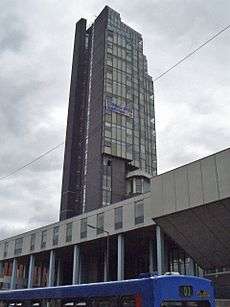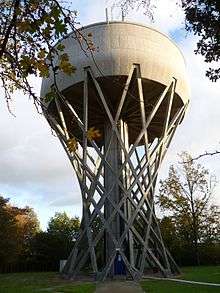Edmund Percey
Edmund Charles "Ted" Percey (6 April 1929 – 25 May 2014) was an architect with Scherrer and Hicks and later a partner in that firm, who was responsible for the design of several notable concrete constructions for the English water industry as well as the brutalist Mathematics Tower for Manchester University.
| Edmund Percey | |
|---|---|
| Born | 6 April 1929 |
| Died | 25 May 2014 |
| Occupation | Architect |
Early life
Ted Percey was born in London on 6 April 1929. He had a sister Eileen. He was educated at Kilburn Grammar School and left school in 1945 to work at Willesden borough council where he met his future wife Betty. He did his national service in the Royal Air Force for two years on turning 18 in 1947, much of which he spent playing the piano in the officer's mess at Gloucester and Stanmore. After his return to Willesden council he married Betty on 22 December 1951 and they had two sons, Alan and Ian.[1]
Architecture
On returning to Willesden council after his national service, Percey was offered a choice of professions and chose to train as an architect while being employed in the council's department of architecture. He studied at the London Polytechnic and qualified as a fellow of the Royal Institute of British Architects. Later, he worked for London County Council.[1]
Percey subsequently joined the firm of Scherrer and Hicks which was formed shortly after the Second World War when Emil Scherrer went into partnership with Kenneth Hicks after Scherrer was commissioned to design the first petro-chemical plant to be built in the United Kingdom.[2] Percey mainly worked on schools[1] but the company also had the contract to design buildings for the Lea Valley Water Company and in 1961, Percey designed its headquarters in Chantry Lane, Hatfield, Hertfordshire.[3] The building includes a large grade II listed concrete mural by William Mitchell, who like Percey once worked for the London County Council.[3]
Other designs by Percey using concrete were the grade II listed water tower at Tonwell (1964) in Hertfordshire,[4] the brutalist Mathematics Tower at Manchester University (1968) (with Emil Scherrer), the hyperboloid water tower at Cockfosters (1968) in north London,[5][6] and the Baydon Water Tower in Wiltshire (1974).[7]
Percey later became a partner in the firm of Edmund Percey Scherrer and Hicks which still trades.
Music
Percey was a semi-professional jazz pianist all his life and was often seen playing Saturday lunchtime sessions at Richmond Jazz School. He combined music with an interest in amateur dramatics for which he arranged and played the music for Addlestone Community Theatre. He was also a keen amateur painter.[1]
Death
Percey died at home on 25 May 2014, a few days after being released from hospital having suffered a malignant melanoma and bleeding on the brain. He was survived by his wife and sons.[1]
Works
 Tonwell Water Tower, Hertfordshire, 1964.
Tonwell Water Tower, Hertfordshire, 1964. Manchester University Mathematics Tower, 1968.
Manchester University Mathematics Tower, 1968. Cockfosters Water Tower, north London (Hertfordshire), 1968.
Cockfosters Water Tower, north London (Hertfordshire), 1968. Baydon Water Tower, Wiltshire, 1974.
Baydon Water Tower, Wiltshire, 1974.
Selected publications
- "The emancipated water tower", Concrete, 9 (September 1975), p. 22.
References
| Wikimedia Commons has media related to Edmund Percey. |
- "Obituary". Archived 21 June 2016 at the Wayback Machine The Addlestonian, No. 257 (June–July 2014), p. 8.
- Emil Scherrer - an appreciation. The Scotsman, 23 June 2006. Retrieved 8 November 2016.
- Historic England. "Mural located in former Lee Valley Water Company Offices and free-standing sculpture on west side of entrance drive (1411385)". National Heritage List for England. Retrieved 8 November 2016.
- Historic England. "Water Tower (1391971)". National Heritage List for England. Retrieved 8 November 2016.
- Enfield local heritage list. Archived 9 November 2016 at the Wayback Machine London Borough of Enfield, Enfield, 2016.
- Hyperboloid tower Along the Silk Road. British Water Tower Appreciation Society, 14 November 2009. Retrieved 7 November 2016.
- "Back matter", Twentieth Century Architecture, No. 10, THE SEVENTIES: Rediscovering a lost decade of British architecture (2012)